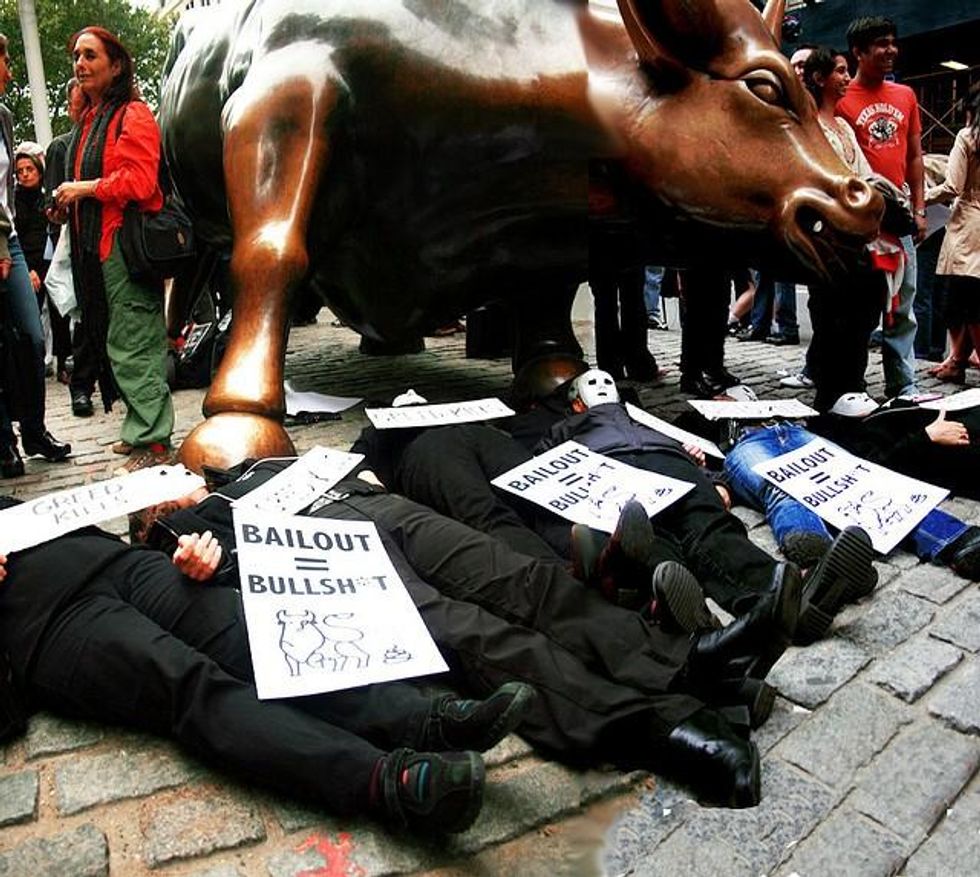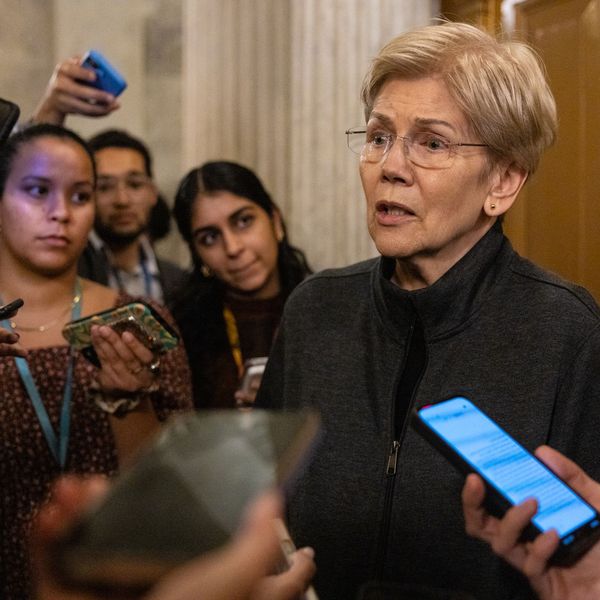NY Fed Study: 'Too Big To Fail Banks' Profit on Taxpayers' Backs
Federal Reserve study shows that megabanks receiving discounts because of 'implicit government subsidy'

A study focusing on the five largest banks--JPMorgan Chase, Citigroup, Bank of America, Wells Fargo and Goldman Sachs--found that these firms benefit from significant discounts on bond issues due to an assumption on the part of investors of government bailout protection.
"Remember all that talk about 'too-big-to-fail' banks having an implicit government subsidy?" writes financial reporter Danielle Douglas. "Well, this study confirms the existence of the subsidy."
Data on domestic bond issues over the 1985-2009 period reveals that, on average, big banks paid almost one third of a percentage point less than smaller banks, adding up to an average discount of $3 million for each bond issue.
Further, the study also compares these "too-big-to-fail" banks with comparable nonbank firms and found that, even in those match-ups, big banks benefit from a discount advantage. As Joao A. C. Santos, study author and vice president of the New York Fed's Research and Statistics Group, explains, these findings suggest that investors are willing to provide these discounts because they "view the largest banks as being more likely to be rescued if they get into financial difficulties."
Santos continues:
If investors believe certain banks are too big to fail, they'll discount risk when providing them with funding, therefore encouraging these banks to take greater risks. Additionally, lower financing costs will induce large banks to behave more aggressively, decreasing charter values for competing banks and pushing them toward higher risk taking.
"Even the pro-megabank New York Federal Reserve has finally acknowledged what most research has already demonstrated--the megabanks receive much more favorable borrowing terms," Senator David Vitter (R-La.) told the Washington Post. Last year, Vitter, along with Sen. Sherrod Brown (D-Ohio), introduced legislation aimed to curb these "too-big-to-fail" institutions.
"To add insult to injury, American taxpayers are funding these advantages after many of their megabanks put our economy on the brink of collapse more than five years ago," Brown added.
_____________________
An Urgent Message From Our Co-Founder
Dear Common Dreams reader, The U.S. is on a fast track to authoritarianism like nothing I've ever seen. Meanwhile, corporate news outlets are utterly capitulating to Trump, twisting their coverage to avoid drawing his ire while lining up to stuff cash in his pockets. That's why I believe that Common Dreams is doing the best and most consequential reporting that we've ever done. Our small but mighty team is a progressive reporting powerhouse, covering the news every day that the corporate media never will. Our mission has always been simple: To inform. To inspire. And to ignite change for the common good. Now here's the key piece that I want all our readers to understand: None of this would be possible without your financial support. That's not just some fundraising cliche. It's the absolute and literal truth. We don't accept corporate advertising and never will. We don't have a paywall because we don't think people should be blocked from critical news based on their ability to pay. Everything we do is funded by the donations of readers like you. Will you donate now to help power the nonprofit, independent reporting of Common Dreams? Thank you for being a vital member of our community. Together, we can keep independent journalism alive when it’s needed most. - Craig Brown, Co-founder |

A study focusing on the five largest banks--JPMorgan Chase, Citigroup, Bank of America, Wells Fargo and Goldman Sachs--found that these firms benefit from significant discounts on bond issues due to an assumption on the part of investors of government bailout protection.
"Remember all that talk about 'too-big-to-fail' banks having an implicit government subsidy?" writes financial reporter Danielle Douglas. "Well, this study confirms the existence of the subsidy."
Data on domestic bond issues over the 1985-2009 period reveals that, on average, big banks paid almost one third of a percentage point less than smaller banks, adding up to an average discount of $3 million for each bond issue.
Further, the study also compares these "too-big-to-fail" banks with comparable nonbank firms and found that, even in those match-ups, big banks benefit from a discount advantage. As Joao A. C. Santos, study author and vice president of the New York Fed's Research and Statistics Group, explains, these findings suggest that investors are willing to provide these discounts because they "view the largest banks as being more likely to be rescued if they get into financial difficulties."
Santos continues:
If investors believe certain banks are too big to fail, they'll discount risk when providing them with funding, therefore encouraging these banks to take greater risks. Additionally, lower financing costs will induce large banks to behave more aggressively, decreasing charter values for competing banks and pushing them toward higher risk taking.
"Even the pro-megabank New York Federal Reserve has finally acknowledged what most research has already demonstrated--the megabanks receive much more favorable borrowing terms," Senator David Vitter (R-La.) told the Washington Post. Last year, Vitter, along with Sen. Sherrod Brown (D-Ohio), introduced legislation aimed to curb these "too-big-to-fail" institutions.
"To add insult to injury, American taxpayers are funding these advantages after many of their megabanks put our economy on the brink of collapse more than five years ago," Brown added.
_____________________

A study focusing on the five largest banks--JPMorgan Chase, Citigroup, Bank of America, Wells Fargo and Goldman Sachs--found that these firms benefit from significant discounts on bond issues due to an assumption on the part of investors of government bailout protection.
"Remember all that talk about 'too-big-to-fail' banks having an implicit government subsidy?" writes financial reporter Danielle Douglas. "Well, this study confirms the existence of the subsidy."
Data on domestic bond issues over the 1985-2009 period reveals that, on average, big banks paid almost one third of a percentage point less than smaller banks, adding up to an average discount of $3 million for each bond issue.
Further, the study also compares these "too-big-to-fail" banks with comparable nonbank firms and found that, even in those match-ups, big banks benefit from a discount advantage. As Joao A. C. Santos, study author and vice president of the New York Fed's Research and Statistics Group, explains, these findings suggest that investors are willing to provide these discounts because they "view the largest banks as being more likely to be rescued if they get into financial difficulties."
Santos continues:
If investors believe certain banks are too big to fail, they'll discount risk when providing them with funding, therefore encouraging these banks to take greater risks. Additionally, lower financing costs will induce large banks to behave more aggressively, decreasing charter values for competing banks and pushing them toward higher risk taking.
"Even the pro-megabank New York Federal Reserve has finally acknowledged what most research has already demonstrated--the megabanks receive much more favorable borrowing terms," Senator David Vitter (R-La.) told the Washington Post. Last year, Vitter, along with Sen. Sherrod Brown (D-Ohio), introduced legislation aimed to curb these "too-big-to-fail" institutions.
"To add insult to injury, American taxpayers are funding these advantages after many of their megabanks put our economy on the brink of collapse more than five years ago," Brown added.
_____________________

